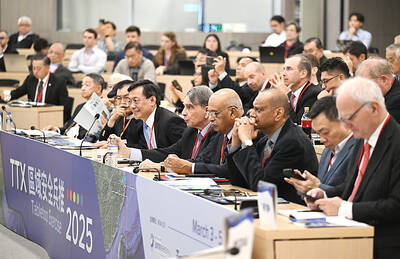The government should push terrestrial and cable television stations to produce more children’s shows, among other measures, to promote locally made children’s programs, the Control Yuan said on Tuesday.
Control Yuan members Lai Ting-ming (賴鼎銘), Fan Sun-lu (范巽綠) and Yeh ta-hua (葉大華) made the recommendations after conducting a probe into government efforts to produce and broadcast children’s shows.
The Control Yuan launched the probe to review the government’s implementation of its obligation to protect children’s right to communication under the UN Convention on the Rights of the Child, the members said in a report.

Photo: Hsieh Chun-lin, Taipei Times
Although not a UN member, Taiwan recognizes the covenants as legally binding under the Act to Implement the International Covenant on Civil and Political Rights and the International Covenant on Economic, Social and Cultural Rights (公民與政治權利國際公約及經濟社會文化權利國際公約施行法).
In August last year, children’s programming took up about 10 percent of the air time on 57 of the nation’s terrestrial, cable, generalist, child-centric, foreign and domestic TV channels, the report said, citing National Communications Commission (NCC) data.
Domestically produced children’s programs accounted for 6.53 percent of all such programs on terrestrial channels, 2.29 percent on cable variety channels and 25.63 percent on cable children’s channels, it said.
The NCC should spearhead a legislative effort to require terrestrial and cable channels based in Taiwan to produce children’s programs so as to increase their air time and share of domestic shows, it said.
Since 2017, various ministries have provided more than NT$200 million (US$7.2 million) in subsidies and capital injections to Public Television Service (PTS) and privately owned media companies to make children’s programs, the report said.
These measures have been somewhat effective, but funding needs to be better coordinated between the NCC and the ministries of culture, education, and science and technology, it said.
The Ministry of Culture is advised to propose laws that would change the legal formula for calculating PTS’ budget, as the current funding level is insufficient, the report said.
PTS receives NT$900 million in public funding a year, while Japan-based NHK receives the equivalent of NT$196.7 billion, the UK-based BBC receives NT$183.5 million and South Korea’s KBS receives NT$32.9 billion a year, it said.
The K-12 Education Administration should subsidize PTS Education and Learning — an initiative by the public station to make its programs available to teachers for use as classroom material, it said.
The infotainment industry does not provide an environment that offers enough jobs and career advancement opportunities in the field of children’s programming, resulting in a shortage of workers, it said.
This shortage has been exacerbated by an absence of professional training in the field at universities, it said, adding that the ministries of culture and education should take action to address the issue.
The Ministry of Science and Technology has encouraged the production of educational science films, but did not give sufficient thought to those catering to children, which it should, the report added.

Actor Darren Wang (王大陸) was questioned by prosecutors for allegedly orchestrating an attack on a taxi driver after he was allegedly driven on a longer than necessary route in a car he disliked. The questioning at the New Taipei City District Prosecutors’ Office was ongoing as of press time last night. Police have recommended charges of attempted murder. The legally embattled actor — known for his role in the coming-of-age film Our Times (我的少女時代) — is under a separate investigation for allegedly using fake medical documents to evade mandatory military service. According to local media reports, police said Wang earlier last year ordered a

President William Lai (賴清德) should protect Taiwan Semiconductor Manufacturing Co (TSMC), and stop supporting domestic strife and discord, former president Ma Ying-jeou (馬英九) wrote on Facebook yesterday. US President Donald Trump and TSMC on Monday jointly announced that the company would invest an additional US$100 billion over the next few years to expand its semiconductor manufacturing operations in the US. The TSMC plans have promoted concern in Taiwan that it would effectively lead to the chipmaking giant becoming Americanized. The Lai administration lacks tangible policies to address concerns that Taiwan might follow in Ukraine’s footsteps, Ma wrote. Instead, it seems to think it could

A man in Tainan has been cleared on charges of public insult after giving the middle finger during a road rage incident, as judges deemed the gesture was made “briefly to express negative feelings.” In last week’s ruling at the High Court’s Tainan branch, judges acquitted a driver, surnamed Cheng (程), for an incident along Tainan’s Nanmen Road in September 2023, when Cheng had spotted a place to park his car in an adjacent lane. Cheng slowed down his vehicle to go into reverse, to back into the parking spot, but the car behind followed too closely, as its driver thought Cheng

DEFENSE: The purpose of the exercises is to identify strategies for the government to control risks during tensions, prevent war and bolster national resilience A tabletop exercise series has begun simulating possible scenarios if the Chinese People’s Liberation Army (PLA) launched a war against Taiwan in the guise of a military exercise. The exercise series is jointly organized by National Chengchi University’s Institute of International Relations, Taiwan Center for Security Studies and Asia-Pacific Policy Research Association. Chinese Nationalist Party (KMT) Legislator Chen Yeong-kang (陳永康), former American Institute in Taiwan (AIT) director William Stanton and Taiwan Center for Security Studies director Liu Fu-kuo (劉復國) attended the event in Taipei yesterday. Scenarios that would be simulated include changing political circumstances in the US during US President Donald Trump’s tenure